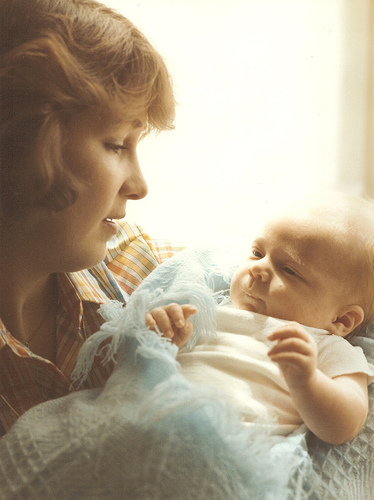This post originally ran in 2013, and issue I address — protecting the anonymity of egg (and sperm) donors — has yet to be resolved. Earlier this year the New York Times ran a story about a woman who had a child thanks to a sperm donor, and then identified that child’s paternal grandmother via a 23andMe test. “Donor anonymity will suffer the same fate as the cassette tape,” said one attorney who specializes in reproductive law.

Joy Morgan* isn’t a mother, but she may have kids. When Morgan was 27, she decided to donate her eggs. The first time she did it for money. “I was about to go back to school, and I had been drowning in a bit of credit card debt,” she says. Eight thousand dollars is a lot of cash, and it wasn’t like she was using her eggs. But by the time she went in for her third donation, Morgan had a good job. “I kind of fell in love with the process,” she says. “I loved the science of it.”
Morgan donated a total of seven times in three years. Each time she produced between 10 and 20 eggs. The fertility clinic likely discarded some, and surely not every egg that made it into a womb produced a baby. But it seems safe to assume that Morgan has a child, possibly several of them. Those kids may one day want to find her.
Most egg and sperm donors donate with the expectation that their identities will remain anonymous. But with ancestry sites now offering genetic testing for as little as $99, it has become increasingly easy for children to track down their donor parents — whether they want to be found or not.
To identify the cracks in the system, let’s examine the case of Ryan Kramer, a 15-year-old who tracked down his biological father — a sperm donor — in 2005. When Ryan and his mom began their search, they had some basic information. They knew when Ryan’s donor was born and where. Using public records, Ryan generated a list of every man born on his donor’s birthday in his donor’s birth city, about 350 men. Then he had another bright idea. He submitted his spit to FamilyTreeDNA.com, a site that promises to find relatives based on your genes. Ryan’s father hadn’t submitted DNA, but other, more distant relatives on his dad’s side had. The men who came up as Ryan’s closest matches shared a last name. So Ryan went back to his public records list. And there he found one man with the same last name.
Ryan sent his donor an email with the subject line “interesting information.” “Fifteen years ago my mother was impregnated with a sperm donation from California Cryobank donor 1058,” he wrote. “You may want to sit down for this next part.”
Ryan’s father told On the Media that he isn’t sure how he feels about this breach of privacy. And it’s easy to see why. People who donate sperm or eggs do it for the money or for altruistic reasons. They don’t do it because they hope to one day have a teenage child on their doorstep. So what happens when that child shows up, unannounced and uninvited? It seems like a recipe for hurt feelings at the very least. What’s more, curiosity isn’t the only reason a child might go looking for his donor. What if Ryan had needed money? Or a kidney? In 2012, a couple sued the New England Cryogenic Center after their son, conceived with help from a sperm donor, was diagnosed with cystic fibrosis. Could donors face lawsuits for passing on a genetic disorders?
Frequently a donor has not one child, but many. The Donor Sibling Registry gives kids a chance to connect half siblings. But this can cause additional headaches for donors. One woman who tracked down her daughter’s sperm donor shared the news with all her half siblings. “Once they found out, everyone wanted to know who he was, and now he knows about all the kids. I talk to him a few times a year, but I’m the only mom who he’s agreed to talk to, and we’re the only family he’s met,” she told Slate.
These privacy concerns certainly aren’t new. New Scientist featured Ryan’s story back in 2005. Betsy Streisand raised these issues in US News & World Report in 2006, and Slate broached the topic in 2010. And last month LWON alum, Virginia Hughes, highlighted many of these concerns in her excellent story Uprooted (go read it!).
But the story feels evergreen because no one has yet figured out how to best address this privacy quagmire. Some countries like Sweden and the UK have simply banned anonymous donations. In most cases that means that when a child reaches adulthood, he can request his donor’s identity. But Gaia Bernstein, a law professor at Seton Hall in New Jersey, argues that such laws contribute to “dire shortages in donor gametes accompanied by long wait-lists.”
Morgan isn’t sure if any of her eggs became children. She hopes they did. She likes the idea of her genes being out there. And it wouldn’t bother her if those kids decide to track her down one day. “I wouldn’t mind having a relationship, but it wouldn’t be family,” she says. “I definitely wouldn’t feel like a mother.”
Morgan doesn’t have any plans to search for her kids, however. Let’s not forget that the privacy issue goes both ways. If children can find their donors, then donors should be able to use the same methods to find their children.
***
*I’ve changed Joy Morgan’s name to protect her identity.
Image courtesy of TylerSmith